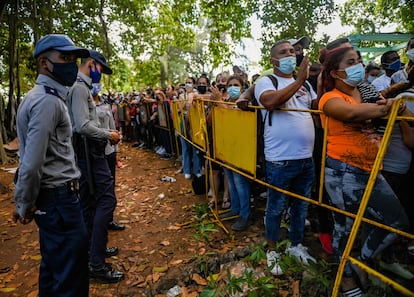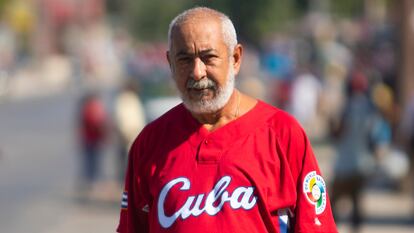Lines in Havana to emigrate, the business of Cuban anguish and a guru named Leonardo Padura
At the end of 2021, Nicaragua eliminated the entry visa for Cuban citizens, and since then thousands have left the island for Managua with the purpose of continuing their journey to the US

“Compadre, did you see the line-up at the the Panamanian Embassy?” Lazaro says to me when I pick him up in Trillo Park, in front of the old Strand cinema, where they used to show Fellini and Wajda films.
After the crisis of the Special Period, the place became a joint called the Palacio de la Rumba and we used to go there on Tuesdays to listen to the Septeto Habanero, a glorious Cuban group that we always asked to sing Cómo está Miguel, that anthological song that in its refrain recommends: “If you want to gladden your heart / and lessen the sadness in your soul / listen to the Habanero, that makes no fuss / and then, if you feel, drink a rum.”
We had such a good time there so many times with the Habanero that we got into the habit of meeting in front of this place in the Cayo Hueso neighborhood when together we went out to “hunt for stories.” Today’s is tremendous and heartbreaking, or at least that’s how we see it, that’s why, to tie down the sorrow, we ordered some rum before leaving for the Panamanian Embassy.
The mission is in the middle of Fifth Avenue, at the height of 24th Street, and when we arrive there is already a police cordon blocking the way, but we sneak in. In Zapata Park, in front of the Panamanian Consulate, there is a crowd of young people with worried faces. There are hundreds of people, many with documents in hand, and suddenly the group begins to shout at one another:
“We want to travel! We want to travel!”
The message is thunderous, and is directed at Panamanian diplomats to come out and provide explanations. On Wednesday, the Central American nation surprisingly announced that as of this Sunday all Cubans passing through its airports bound for another country will have to obtain a transit visa – a procedure that takes at least 15 days and costs $50. The Consulate was immediately surrounded by hundreds of anguished people, who on Friday were still camped there.
There is a precedent: in November 2021, the Nicaraguan government eliminated the entry visa for Cuban citizens, and since then thousands of people have left the island for Managua with the purpose of continuing their journey to the United States.
US Customs and Border Protection (CBP) data speak for themselves. Since last December, more than 20,000 Cubans have irregularly entered US territory via the Mexican border, almost 15 times more than in the same period last year.
“People can’t take it anymore, they leave en masse through anywhere, even if it costs them dearly and they risk their lives. It’s dramatic,” says Lázaro.
We talk to some young people from Holguín in the tumult. They say to our faces that “you can’t live in Cuba” and show us their airplane reservation. As there are few direct flights between Cuba and Nicaragua and they were afraid that the so-called “Central American route” would be closed, they bought a ticket Havana-Panama-San Salvador-Managua. It cost them $3,400 each (equivalent to four round trips to Spain), paid for by their family in Miami.
Their ticket was for March 13, they say, but with the new Panamanian regulation they will no longer be able to fly and it is a non-refundable ticket. Like them, most of the people gathered here request of Panama that the measure does not go into effect until April, to give time to those who already had the trip in March.
“It’s a stampede,” laments Lázaro, who has lost friends, neighbors, relatives and two ex-wives in recent years. He says that next to his house lives a babalawo friend, a Santería priest, whose appointment books are full. “Many of those who intend to leave do witchcraft so that the trip will be granted to them. Every day they sacrifice roosters and pigeons so that the orishas will protect them and they won’t have any problems on the journey.”
Lázaro becomes fatherly with the Holguineros, explaining to them that the risk of leaving by crossing borders is too high: “Everywhere is full of mafias and coyotes, and there is also the possibility of being deported back to Cuba”. The boys listen to him, but they reply: “The important thing is to get out of here as soon as possible, then we’ll see”.
At this point, and as the message is not getting through, Lázaro takes me to the nearby restaurant El Aljibe and we order two more rums. He wants me to call the writer Leonardo Padura, author of Like Dust in the Wind, the great novel of post-revolutionary Cuban exile.
Lázaro considers him his “guru”, more on this f**ked topic.

From the Mantilla neighborhood Padura says that he watches TV newscasts every chance he gets and that there he hears about a country. “But I go out to the streets of my neighborhood, or any neighborhood in Havana, and I see and they talk to me about a different country, like a parallel one. That country on the street is a country overwhelmed, on the verge of despair due to the lack of almost everything,” he says.
“People have been living for two years in queues to buy whatever they can find, and I hear almost everyone complaining that they don’t even have enough money to get started. No one should be surprised then that there are so many people, of any age and condition, looking for a way to leave this real country, to go anywhere, by any means,” he says.
Lázaro shares Padura’s diagnosis 100%, and with a high-pitched voice, he starts cursing the government out loud for “the situation we have reached”. He also angrily takes it out on those he calls “the merchants of Cuban anguish”: here he includes the airlines that are making a killing with the needs of the people and their eagerness to leave -today a trip to Managua, by any route, does not cost less than 3,000 dollars; to the polleros [smugglers] who charge per trip to cross the borders; to the lawyers who specialize in getting Cuban emigrants out of the immigration offices in Mexico when they are captured; and also to embassies such as the one in Panama, “which make life more difficult for Cubans and want to charge them 50 dollars for a transit visa that they do not demand from anyone else”.
According to data he has looked up on the Internet, leaving Cuba for Nicaragua, paying for transportation and coyotes to cross the various borders to Mexico, plus the corresponding bribes to get to the United States, costs between $8,000 and $10,000 per head. “Unfortunately, Cuban pain is good business for all these people.”
The official newspaper Granma admits that there is a “sustained increase in irregular emigration” and also reports news of the repatriation of a hundred people. But it blames Washington for stimulating this flow by keeping in force laws such as the Cuban Adjustment Act, which grants benefits to emigrants from the island who manage to arrive (although with many more restrictions than before), and for not complying with the migratory agreements signed between both countries, which establish that the United States will grant a minimum of 20,000 immigrant visas per year.
We return to Cayo Hueso and the line in front of the Panamanian Embassy is still on fire. Things are just as heated in the store in front of Padura’s house. As we get out of the car, in front of the old Strand movie theater, Lázaro remembers the glorious sound of the Habanero: “If you want to gladden your heart/ and lessen the sadness in your soul...”. And we say goodbye until tomorrow.
In the evening he calls me. The Panamanian Embassy announced that it is postponing the entry into force of the transit visa rule for Cubans until March 16. “The Holguineros were saved. Tomorrow we must toast,” he exclaims.
Tu suscripción se está usando en otro dispositivo
¿Quieres añadir otro usuario a tu suscripción?
Si continúas leyendo en este dispositivo, no se podrá leer en el otro.
FlechaTu suscripción se está usando en otro dispositivo y solo puedes acceder a EL PAÍS desde un dispositivo a la vez.
Si quieres compartir tu cuenta, cambia tu suscripción a la modalidad Premium, así podrás añadir otro usuario. Cada uno accederá con su propia cuenta de email, lo que os permitirá personalizar vuestra experiencia en EL PAÍS.
¿Tienes una suscripción de empresa? Accede aquí para contratar más cuentas.
En el caso de no saber quién está usando tu cuenta, te recomendamos cambiar tu contraseña aquí.
Si decides continuar compartiendo tu cuenta, este mensaje se mostrará en tu dispositivo y en el de la otra persona que está usando tu cuenta de forma indefinida, afectando a tu experiencia de lectura. Puedes consultar aquí los términos y condiciones de la suscripción digital.








































